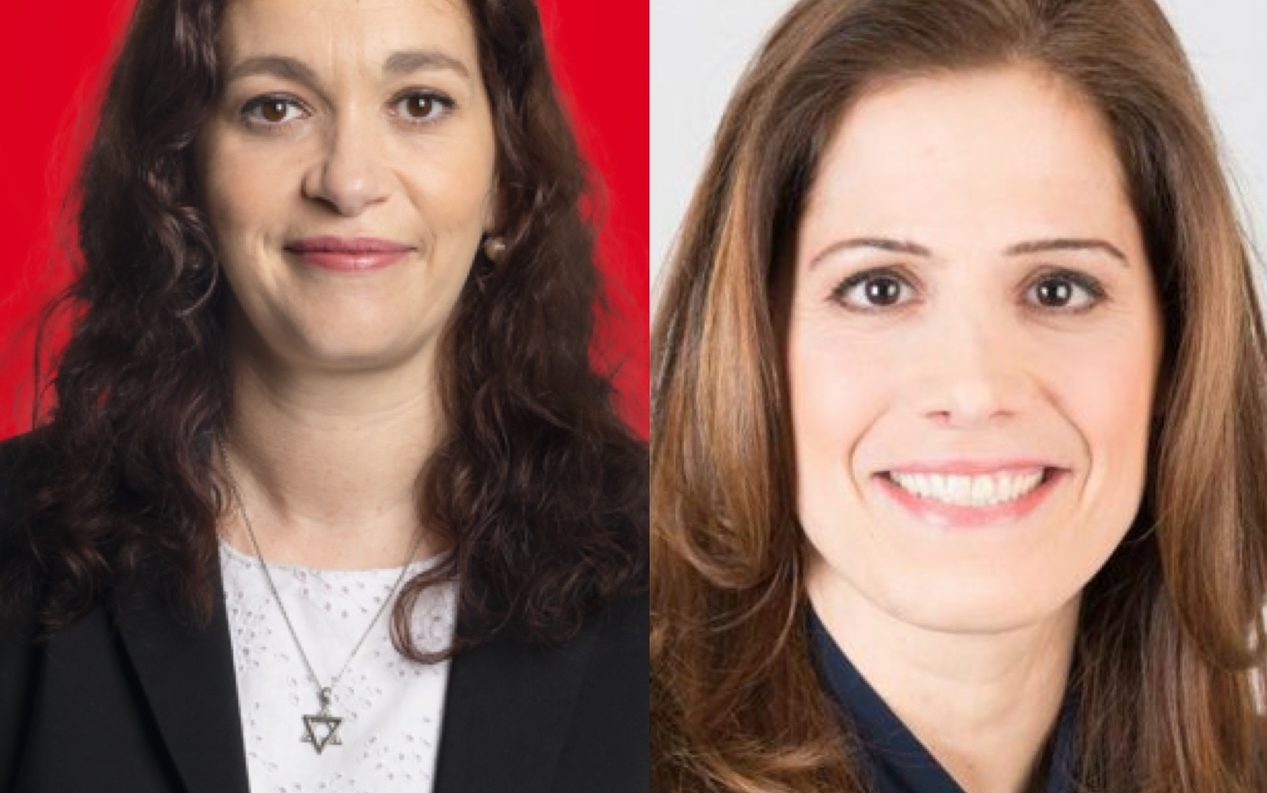For the first time in Quebec history, two Jewish women will be members of the National Assembly, but they will be sitting on opposite sides of the floor.
Elisabeth Prass of the Liberal Party of Quebec and Pascale Déry of the Coalition Avenir Québec (CAQ) were elected on Oct. 3 by wide margins in D’Arcy McGee and Repentigny, respectively. The CAQ, led by Premier François Legault, won a landslide victory in the province.
Both women have a Sephardic heritage. Prass is the daughter of Moroccan and Latvian immigrants, while Déry comes from a prominent Moroccan family; her father William was once president of the Montreal Sephardic community.
They become the 10th and 11th Jewish MNAs since Peter Bercovitch took office in 1916.
The question now is whether Déry, a former well-known French television journalist, introduced in July by Legault as a star candidate, will be named to the cabinet. However, with such a huge CAQ caucus to choose from—90 members according to preliminary results—her chances may have diminished.
As for Prass’s fortunes, the political insider stands to be assigned a senior critic’s role in the official opposition. The Liberals managed to retain that status, although their ranks have been reduced to just 21 MNAs, again by Elections Québec’s most recent information.
Both women were expected to win, and each garnered the majority of ballots cast, a remarkable accomplishment in a contest with five major parties in the running.
D’Arcy McGee is the only one of Quebec’s 125 ridings with a Jewish majority, albeit one that has shrunk in recent years due to a redrawing of the electoral map, and has been Liberal throughout its history, except for the Equality Party leader Robert Libman’s upset victory in 1989 over English rights.
Prass succeeds David Birnbaum whose riding office she directed for seven years. She previously worked in Quebec City as a policy adviser to two Liberal economic development ministers.
Prass took 51 percent of the vote, more than 7,000 votes ahead of her nearest challenger, Bonnie Feigenbaum of the Conservative Party of Quebec, a former Liberal whose spirited fight centred on anglophones’ frustration with the Liberals’ handling of the CAQ’s Bill 96, the strengthened French language law adopted this year.
Although Prass does not live in D’Arcy McGee, she notes that she grew up there and that her mother is still a resident. Prass has emphasized her sensitivity to caregivers, speaking about her son with special needs who attends the Yaldei school, located in D’Arcy McGee.
Déry, a former unsuccessful Conservative candidate in the federal riding of Mount Royal, was bestowed the safe CAQ riding of Repentigny, off the eastern tip of the island of Montreal.
She captured 52 percent of the vote, well ahead of the second-place Parti Québécois candidate.
The Côte St. Luc resident will be representing an overwhelmingly francophone constituency, among whom there are few Jews.
Déry describes herself as a “nationalist” who fully supports Bill 96 (“The place of French is non-negotiable.”) and endorses Bill 21, the secularism law banning certain public servants’ wearing religious symbols passed in 2019.
While not explicitly abandoning federalism, Déry affirmed, “I adhere to the vision of the CAQ and of Mr. Legault… It’s Quebec first and before all.”
She explained her jump into federal politics in 2015, leaving a successful TV news career, as motivated by wanting “to improve the quality of life and defend the interests of Quebecers.”
Déry has had to justify how she squares her promotion of French with her most recent job as media relations director for Air Canada, defending its CEO Michael Rousseau who was excoriated for his inability to speak the language.
Although fully bilingual, Prass presents herself as a strong defender of the rights of anglophones, and anchored her campaign on the claim the Liberals are the sole “true” federalists among the five major parties, and the only party to vote against Bills 21 and 96, as well as Bill 40, another controversial law that abolished school boards (the English boards secured an exemption through a constitutional challenge.)
“We stand for a confident, inclusive Quebec within a united Canada,” Prass said in a campaign video.
She aimed her sights on the Conservatives and its leader Éric Duhaime who openly courted the Anglo vote with his opposition to Bill 96. He does support Bill 21 and Prass circulated a quote of his that “(a kippah) is a religious symbol that is obvious and expresses bias.”
On social media, the Centre for Israel and Jewish Affairs stated: “ We are eager to work with you and your team to fight against antisemitism and to help the Jewish community fully flourish in Quebec.”
Benoit Charette, the minister responsible for combating racism with whom CIJA had particularly warm relations, and Economic Development Minister Pierre Fitzgibbon who made an official visit to Israel this spring, were re-elected.
Voter turnout in D’Arcy McGee was under 48 percent. With a CAQ victory a virtual certainty and disillusionment with the Liberals, there had been conjecture that electors would be inclined to stay home.
CIJA was also concerned that the advance polls coincided partially with Rosh Hashanah. The organization persuaded the province’s chief electoral officer to add staff at the returning officers’ offices in D’Arcy McGee, Mount Royal-Outremont and Robert Baldwin where there are large Jewish populations to facilitate alternative voting over Sept. 23-29.
The latter two ridings continue to be Liberal, as do all 13 ridings in western Montreal.
Many Jews were concerned that Québec Solidaire, a left-wing sovereignist party that endorses the BDS campaign against Israel, might gain in strength. However, its seat count remains at 11, making it the second opposition party once again.
